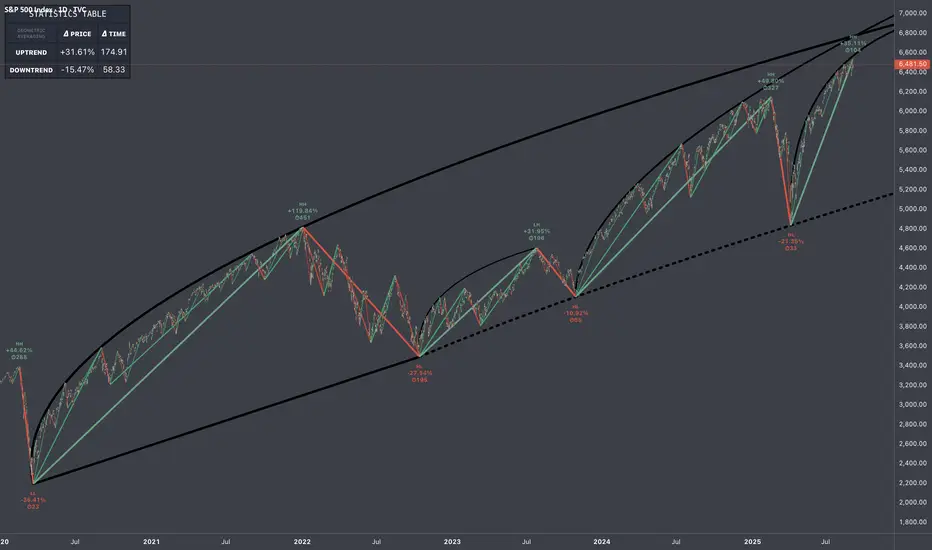I don't usually cover fundamental landscape unless several key economic indicators and policies paint a picture of emerging trouble.
Three False Narratives:
The current economic policies are:
What I'm Watching:
- Jobs market collapse is real
The NFP print of 22K is a disaster, missing estimates by a wide margin.
Revisions are key: June was revised down to -13,000 jobs. This is the first negative print since 2020 and signals the slowdown began months ago.
The U6 rate jumping to 8.1% is a huge red flag. This includes part-time workers who want full-time jobs and those discouraged from looking.It shows significant underlying weakness the headline U3 rate hides.
- Tariffs didn't work
The policy was supposed to boost US manufacturing and slash the trade deficit. The opposite is happening.
US Manufacturing PMI has been in contraction for 6 straight months.Why? Tariffs on steel and aluminum have made input costs soar, crippling competitiveness.
The Goods Trade Deficit ballooned 22% in July to $103.6B.Imports rose nearly 6x faster than exports. This is a direct contradiction to the policy's goal and acts as a tax on consumers and businesses.
- Stagflation Risk
Weak Growth + Persistent Inflation
Growth is stalling: Weak job creation, falling manufacturing output.
Inflation is sticky: While wages cooled slightly, prices remain high (as confirmed by consumers in Tennessee interviews).
🏛️ The Fed is now trapped. Cutting rates could fuel more inflation. Hiking rates would kill more jobs. There is no good exit. - Tourism: An estimated $80 billion in lost revenue is a massive hit. This has a multiplier effect, hurting local economies far beyond the initial number.
Energy: Cancelling near-complete renewable projects (like the RI wind farm) creates uncertainty and hurts long-term energy capacity planning.
Agriculture: Farmers in Arkansas and elsewhere are facing bankruptcy due to low prices, high costs from tariffs, and labor shortages. This is a repeat of the 2018 bailout scenario.
Three False Narratives:
- "The Data is Wrong": Attacking the BLS methodology and promising upward revisions. This is shooting the messenger. The trend across multiple reports is clearly negative.
- "Just Wait a Year": Claiming the benefits of the policies are just around the corner. This is a hope-based strategy, not data-driven.
- "Look at Private Investment!": Pointing to vague, performative pledges from tech CEOs (like Zuckerberg's hot-mic "$600B" comment).
The current economic policies are:
- Failing to achieve their stated goals.
- Increasing costs for businesses and consumers.
- Creating uncertainty that paralyzes investment.
- Increasing the risk of a stagflationary environment.
- The market has been resilient, but fundamentals are starting to crack.
What I'm Watching:
- Next CPI and PCE prints for inflation persistence.
- Next month's NFP for confirmation of the trend.
- Fed rhetoric: If they would acknowledge the growth scare
ノート
EXTERNAL THREATSIt’s important because many countries which buy US Bonds, are also reacting to deteriorating figures of US economy in their own way.
That meeting held in Beijing recently with broad BRICS/SCO dynamic, was way too demonstrative for a regular event. It looked like China's declaration of fundamental shift in global power. (Obviously I'm skeptical in individual capacities of those countries to challenge US head-to-head, but when they are too close together, it usually grows into a strategic consequences for U.S. economic security and geopolitical power.)
- Geopolitical Realignment
Nations that historically had rivalries (like India and China) are setting aside differences to cooperate. That shows U.S. policy has pushed potential adversaries closer together instead of keeping them divided. - Erosion of U.S. Influence
These countries represent more than half the world’s population and huge portions of global GDP and energy resources. Their growing solidarity directly challenges Western-led systems (NATO, G7, SWIFT, dollar dominance). - Economic Consequences
If BRICS develops alternative currencies or trade systems, America loses the leverage that comes from the dollar being the global reserve. That means higher borrowing costs, weaker sanctions power, and less control over global trade flows. - Strategic Messaging
The image of Modi walking hand in hand with Putin, laughing together wasn’t just for their domestic base! It was staged to show the world that a multipolar order is rising, and the U.S. is being deliberately excluded. - Domestic Risk
Tariff-first approach doesn’t just fail to stop this trend - it accelerates it! If the courts finally strike down this central tariff authority, the U.S. may find itself without any economic policy tools at a time when rivals are planning decades ahead.
It’s important to document these tendencies, because these summits aren’t just photo ops.. They’re visible proof that the global system is reorganizing around America’s absence.
Unlock exclusive tools: fractlab.com
ᴀʟʟ ᴄᴏɴᴛᴇɴᴛ ᴘʀᴏᴠɪᴅᴇᴅ ʙʏ ꜰʀᴀᴄᴛʟᴀʙ ɪꜱ ɪɴᴛᴇɴᴅᴇᴅ ꜰᴏʀ ɪɴꜰᴏʀᴍᴀᴛɪᴏɴᴀʟ ᴀɴᴅ ᴇᴅᴜᴄᴀᴛɪᴏɴᴀʟ ᴘᴜʀᴘᴏꜱᴇꜱ ᴏɴʟʏ.
ᴘᴀꜱᴛ ᴘᴇʀꜰᴏʀᴍᴀɴᴄᴇ ɪꜱ ɴᴏᴛ ɪɴᴅɪᴄᴀᴛɪᴠᴇ ᴏꜰ ꜰᴜᴛᴜʀᴇ ʀᴇꜱᴜʟᴛꜱ.
ᴀʟʟ ᴄᴏɴᴛᴇɴᴛ ᴘʀᴏᴠɪᴅᴇᴅ ʙʏ ꜰʀᴀᴄᴛʟᴀʙ ɪꜱ ɪɴᴛᴇɴᴅᴇᴅ ꜰᴏʀ ɪɴꜰᴏʀᴍᴀᴛɪᴏɴᴀʟ ᴀɴᴅ ᴇᴅᴜᴄᴀᴛɪᴏɴᴀʟ ᴘᴜʀᴘᴏꜱᴇꜱ ᴏɴʟʏ.
ᴘᴀꜱᴛ ᴘᴇʀꜰᴏʀᴍᴀɴᴄᴇ ɪꜱ ɴᴏᴛ ɪɴᴅɪᴄᴀᴛɪᴠᴇ ᴏꜰ ꜰᴜᴛᴜʀᴇ ʀᴇꜱᴜʟᴛꜱ.
免責事項
これらの情報および投稿は、TradingViewが提供または保証する金融、投資、取引、またはその他の種類のアドバイスや推奨を意図したものではなく、またそのようなものでもありません。詳しくは利用規約をご覧ください。
Unlock exclusive tools: fractlab.com
ᴀʟʟ ᴄᴏɴᴛᴇɴᴛ ᴘʀᴏᴠɪᴅᴇᴅ ʙʏ ꜰʀᴀᴄᴛʟᴀʙ ɪꜱ ɪɴᴛᴇɴᴅᴇᴅ ꜰᴏʀ ɪɴꜰᴏʀᴍᴀᴛɪᴏɴᴀʟ ᴀɴᴅ ᴇᴅᴜᴄᴀᴛɪᴏɴᴀʟ ᴘᴜʀᴘᴏꜱᴇꜱ ᴏɴʟʏ.
ᴘᴀꜱᴛ ᴘᴇʀꜰᴏʀᴍᴀɴᴄᴇ ɪꜱ ɴᴏᴛ ɪɴᴅɪᴄᴀᴛɪᴠᴇ ᴏꜰ ꜰᴜᴛᴜʀᴇ ʀᴇꜱᴜʟᴛꜱ.
ᴀʟʟ ᴄᴏɴᴛᴇɴᴛ ᴘʀᴏᴠɪᴅᴇᴅ ʙʏ ꜰʀᴀᴄᴛʟᴀʙ ɪꜱ ɪɴᴛᴇɴᴅᴇᴅ ꜰᴏʀ ɪɴꜰᴏʀᴍᴀᴛɪᴏɴᴀʟ ᴀɴᴅ ᴇᴅᴜᴄᴀᴛɪᴏɴᴀʟ ᴘᴜʀᴘᴏꜱᴇꜱ ᴏɴʟʏ.
ᴘᴀꜱᴛ ᴘᴇʀꜰᴏʀᴍᴀɴᴄᴇ ɪꜱ ɴᴏᴛ ɪɴᴅɪᴄᴀᴛɪᴠᴇ ᴏꜰ ꜰᴜᴛᴜʀᴇ ʀᴇꜱᴜʟᴛꜱ.
免責事項
これらの情報および投稿は、TradingViewが提供または保証する金融、投資、取引、またはその他の種類のアドバイスや推奨を意図したものではなく、またそのようなものでもありません。詳しくは利用規約をご覧ください。
